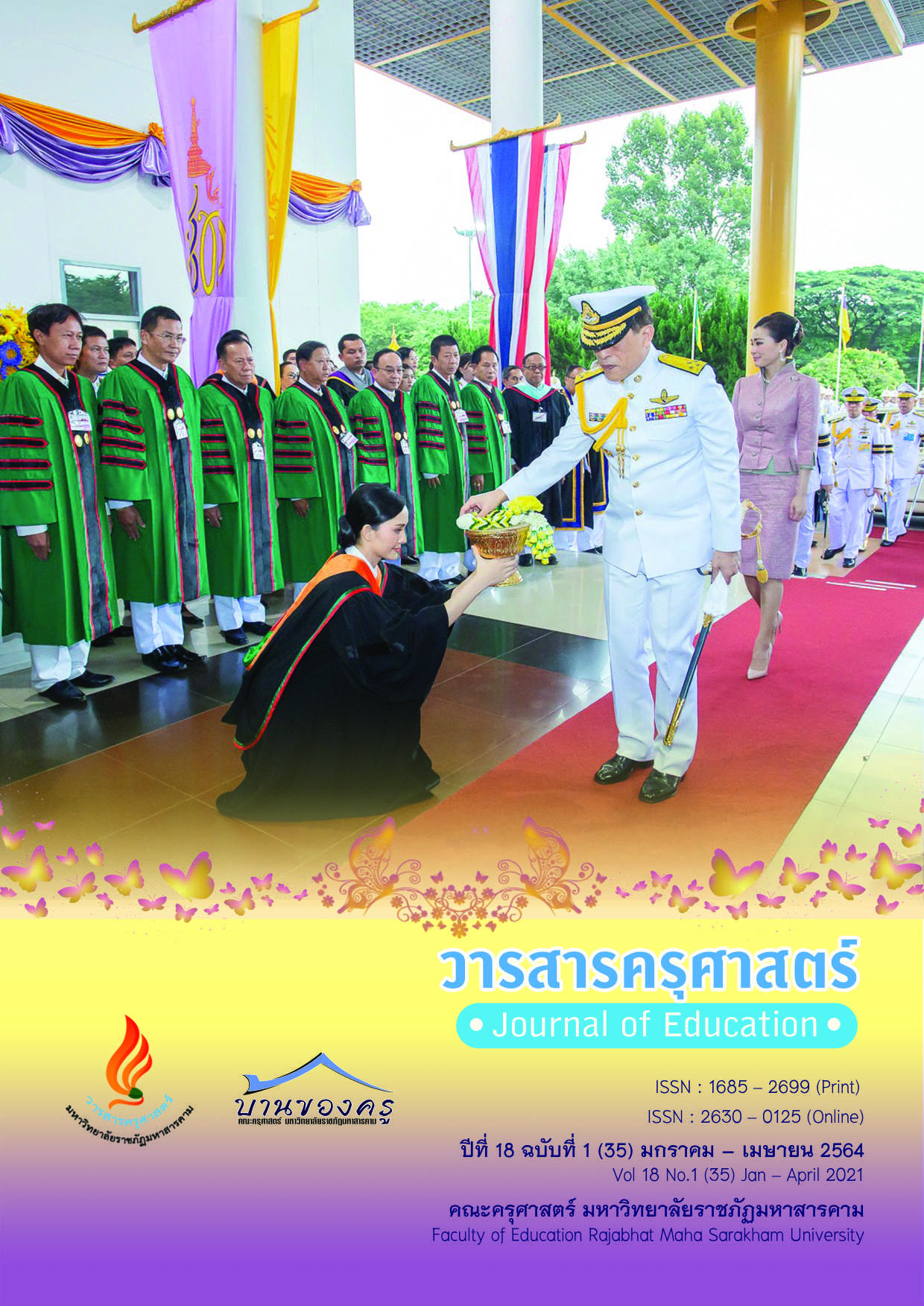Innovative Leadership of School Administrators Affecting High Performance Organization of Schools under the Nakhon Phanom Primary Educational Service Area Office 1
Main Article Content
Abstract
The purpose of this study was to innovative leadership of school administrators affecting high performance organization of schools under the Nakhon Phanom Primary Educational Service area office 1.The samples were school administrators and teachers, totaling 350 people. The instrument used for collecting data was five-rating scale questionnaire. The statistics used were percentage, mean, standard deviation, t-test (Independent Samples), one-way analysis of variance analysis, and multiple regression stepwise.
The research result were as follows: 1)overall innovative leadership levels of school administrators classified by school status and size were at the highest level. In comparison, the overall innovative leadership levels of school administrators classified by school status were not different, whereas the comparison which classified by school size were not different; 2) High performance organization of Schools was at the highest level. In comparison, high performance organization of schools classified by status a revealed the statistically significant different at the .05 level and school size not difference. 3) There were 4 variables of innovative leadership of school administrators could affect and predict 75% of high performance organization of school with statistical significance at the .05 level. These could be formed as the regression raw score and standardized score as follows:
Y' = 1.06 + .26X4 + .20X5 + .17X6 + .14X1
Z'y = .31Z4 + .26Z5 + .21Z6 + .17Z1
Article Details
ข้อกำหนดเบื้องต้นที่ผู้นิพนธ์(ผู้ส่งบทความ) ควรทราบ
1. ผู้นิพนธ์ที่ประสงค์จะลงตีพิมพ์บทความกับวารสาร ตั้งแต่เดือนมกราคม 2563 เป็นต้นไป ให้ใช้รูปแบบใหม่ (Template 2563) โดยสามารถดูตัวอย่างได้ที่เมนู GUIDELINES
2. จะตีพิมพ์และเผยแพร่ได้ ต้องผ่านการประเมินจากผู้ทรงคุณวุฒิ (Peer Review)
3. การประเมินบทความโดยผู้ทรงคุณวุฒิ (Peer Review) เป็นแบบ Double Blind
4. การอ้างอิงบทความใช้หลักเกณฑ์ APA (American Psychological Association) คลิก
5. บทความถูกปฏิเสธการตีพิมพ์ ไม่ผ่านการประเมิน ผู้นิพนธ์ขอยกเลิกเองหรือชำระเงินก่อนได้รับการอนุมัติ ทางวารสารไม่มีนโยบายการคืนเงิน
References
จีรศักดิ์ นามวงษ์. (2020). การพัฒนาโปรแกรมเสริมสร้างภาวะผู้นำเชิงนวัตกรรมของผู้บริหารสถานศึกษาสังกัดสำนักงานเขตพื้นที่การศึกษาประถมศึกษาศรีสะเกษ เขต1. วารสารมหาจุฬานาครทรรศน์, 7(6), 347-348.
จีราภา ประพันธ์พัฒน์. (2560). การศึกษาภาวะผู้นำเชิงนวัตกรรมของผู้บริหารสถานศึกษาตามความคิดเห็น ของครูสังกัดสำนักงานเขตพื้นที่การศึกษาประถมศึกษาปทุมธานี. [วิทยานิพนธ์ปริญญามหาบัณฑิต]. มหาวิทยาลัยเทคโนโลยีราชมงคลธัญบุรี.
บุญชม ศรีสะอาด. (2554). การวิจัยเบื้องต้น. พิมพ์ครั้งที่ 9. สุรีวิทยาสาส์น.
พิทักษ์ ทิพย์วารี. (2558). รูปแบบการพัฒนาภาวะผู้นำทางนวัตกรรมสำหรับผู้บริหารสถาบันการพลศึกษา. [วิทยานิพนธ์ปริญญาดุษฎีบัณฑิต]. มหาวิทยาลัยสงขลานครินทร์.
เพ็ญศิริ ฤทธิกรณ์. (2559). ทักษะการบริหารของผู้บริหารที่ส่งผลต่อความเป็นองค์กรสมรรถนะสูงของโรงเรียนสังกัดสำนักงานเขตพื้นที่การศึกษาประถมศึกษาพระนครศรีอยุธยา เขต 2 [วิทยานิพนธ์ ปริญญามหาบัณฑิต]. มหาวิทยาลัยศิลปากร. https://so02.tci-thaijo.org/index.php/EdAd/article/view/113820
ไพฑูรย์ สินลารัตน์. (2553). ผู้นำเชิงสร้างสรรค์และผลิตภาพ : กระบวนทัศน์ใหม่และผู้นำใหม่ทางการศึกษา. โรงพิมพ์แห่งจุฬาลงกรณ์มหาวิทยาลัย.
ธารารัตน์ ภูศักดิ์. (2558). ปัจจัยและกระบวนการบริหารที่ส่งผลต่อการเป็นองค์การสมรรถนะสูงขององค์การบริหารส่วนจังหวัดขอนแก่น. วารสารวิจัย มข. มส.(บศ.), 3(3), 44-53.
ยงยุทธ เกษสาคร. (2541). การวางแผนและนโยบายทางด้านทรัพยากรมนุษย์. สถาบันราชภัฏสวนดุสิต.
เวียงวิวรรธน์ ทำทูล. (2557). ภาวะผู้นำเชิงนวัตกรรมของผู้บริหารที่ส่งผลต่อองค์การขีดสมรรถนะสูงของโรงเรียนในสังกัดสำนักงานเขตพื้นที่การศึกษามัธยมศึกษา เขต 21. [วิทยานิพนธ์ปริญญามหาบัณฑิต]. มหาวิทยาลัยวิทยาลัยขอนแก่น. https://so02.tci-thaijo.org/index.php/EDKKUJ/article/view/49964
ศศิประภา ชัยประสิทธิ์. (2553). องค์กรแห่งนวัตกรรมทางเลือกของผู้ประกอบการยุคใหม่.นักบริหาร, 30(2), 60-69.
สำนักงานนวัตกรรมแห่งชาติ. (2547). การจัดการนวัตกรรมสำหรับผู้บริหาร. กระทรวงวิทยาศาสตร์และเทคโนโลยี.
สำนักงานเลขาธิการสภาการศึกษา. (2560). แผนการศึกษาแห่งชาติ พ.ศ. 2560 - 2579. พริก หวานกราฟฟิคจำกัด.
อรุณี ไพศาลพาณิชย์. (2560). องค์การนวัตกรรม : มโนทัศน์ และตัวแบบเชิงทฤษฎี.วารสารพัฒนบริหารศาสตร์, 57(3), 158-187.
A. A, De Waal. (2007). The Characteristics of High Performance Organization.Business Strategy Series, 8(3), 179-185.
Badubi, R.M. (2017). Theories of Motivation and Their Application in Organizations: A Risk Analysis. International Journal of Innovation and Economic Development, 16(1), 32-37.
Blanchard, Ken. (1988). Shaping Team Synergy. Today’s Office, 22(7), 91-95.
Kline, R. B. (2005). Principles and Practice of Structural Equation Modeling. Guilford Press.
Watt, D. (2002). How innovation occurs in high schools within the network of innovative schools: The four pillars of innovation research project. The Conference Board of Canada.


